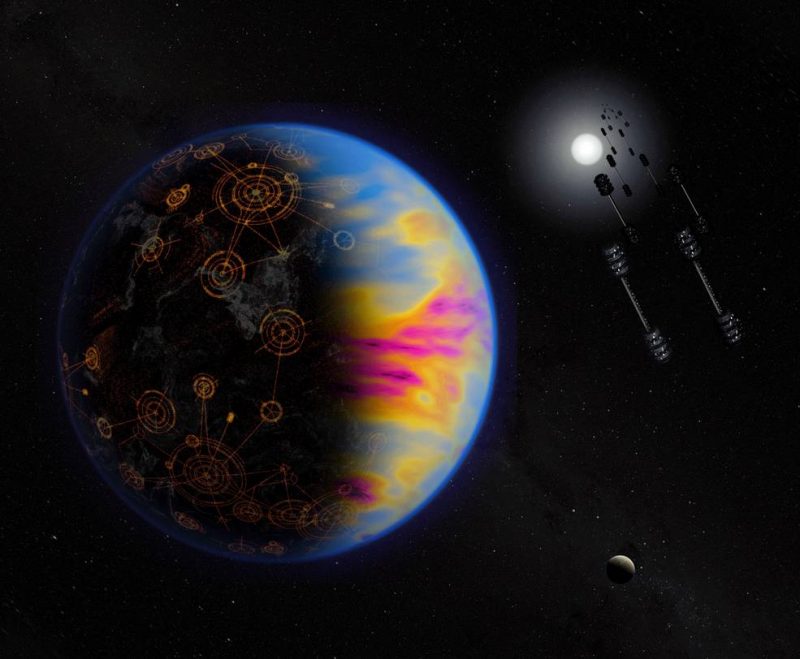
Is there intelligent life elsewhere in our Milky Way galaxy? We don’t know. But if and when we do find evidence of other intelligent beings … how might we respond? To help humanity prepare for such a profound event, the University of St. Andrews in the UK said this month (November 2, 2022) that it’s establishing a new international research center. The center is called the SETI Post-Detection Hub.
If we find intelligent life beyond Earth
The SETI Post-Detection Hub will bring together a diverse range of expertise – in both the sciences and the humanities – from all around the world.
Its goal is to establish impact assessments, protocols, procedures and treaties designed specifically for an appropriate response to an alien civilization. As John Elliott, coordinator of the Hub at the University of St. Andrews, stated:
Science fiction is awash with explorations of the impact on human society following discovery of, and even encounters with, life or intelligence elsewhere. But we need to go beyond thinking about the impact on humanity. We need to coordinate our expert knowledge not only for assessing the evidence, but also for considering the human social response, as our understanding progresses and what we know and what we don’t know is communicated.
And the time to do this is now. Scanning signals of assumed extra-terrestrial origin for structures of language – and attaching meaning – is an elaborate and time-consuming process. During it, our knowledge will be advanced in many steps as we learn [to speak and understand] ‘Extra-Terrestrial’.
Let’s prepare beforehand, these scientists say
These researchers believe that society should be prepared for the confirmation of alien life, even if it doesn’t happen soon, and even if it never happens at all. As Elliott explained, we can’t be ill-prepared for such history-changing news:
Will we ever get a message from E.T.? We don’t know. We also don’t know when this is going to happen. But we do know that we cannot afford to be ill-prepared – scientifically, socially and politically rudderless – for an event that could turn into reality as early as tomorrow and that we cannot afford to mismanage.
The discovery of intelligent alien life would be significantly different than, say, finding primitive microbes on Mars or on one of the ocean moons in our solar system. As the SETI Post-Detection Hub website explains:
The potential discovery of microbial life will likely raise different types of concern than that which would follow the discovery of intelligent life …
Clearly, a signal from an intelligent civilization would be a much-bigger deal.
How likely is it to find life beyond Earth?
Short answer to the question above: we have no idea. But we’re more likely to find extraterrestrial intelligence now than 100 years ago, simply because we’re looking for it now. As the Hub website said:
We have contemplated life on other worlds for countless generations; the search for extra–terrestrial intelligence and their technology has now been an ongoing endeavor for decades.
Our own technical resources have since improved significantly, and with those the chances of detection are therefore continually increasing. Social interest has risen considerably recently, due to the detection of thousands of planets around distant stars in our own galaxy …
These scientists point out that the United Nations has plans in place for the possibility of an asteroid impact on Earth. But it doesn’t have plans for the possibility of eventual human contact with an alien species from another world.

Outdated contact protocols
It’s not that no one has ever tried. In 2010, the Royal Society held a meeting called The detection of extra-terrestrial life and the consequences for science and society. There was a discussion, but no specific plans.
Also in 2010, SETI itself last updated its own protocols (first written in 1989) for first contact. But the University of St. Andrews wants to go further. It contends the SETI protocols:
… Constitute non-enforceable aspirations and fall short of being useful for managing in practice the full process of searching, handling candidate evidence, confirmation of detections, post-detection analysis and interpretation and potential response.
What the Hub wants to do
In contrast, the SETI Post-Detection Hub aims to act as a permanent “home” for a more comprehensive framework. The topics the Hub will include and work on include message decipherment, data analytics, regulatory protocols, space law and societal impact strategies.
The SETI Post-Detection Hub is an initiative of the UK SETI Research Network (UKSRN), hosted jointly by the St. Andrews Center for Exoplanet Science and the Center for Global Law and Governance.
The search for advanced extraterrestrial life has become more mainstream in recent years. EarthSky also recently reported on how astronomers are now looking for signs of alien technology, from pollution to megastructures in space. This is a significant change from early SETI, which focused on looking for just radio signals, and then later focused on laser signals.
New technologies are allowing astronomers to broaden the search for extraterrestrial life. If that search succeeds, it will be monumental. And now, perhaps, we can better prepare for the implications.
Bottom line: Will we find life beyond Earth? The new SETI Post-Detection Hub research initiative wants humanity to be ready, if and when it ever happens.
The post If we find life beyond Earth, how will we respond? first appeared on EarthSky.
0 Commentaires